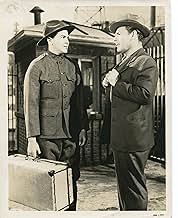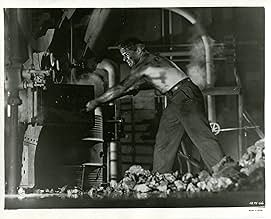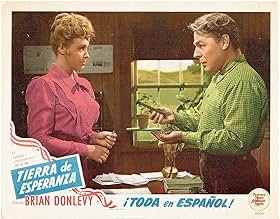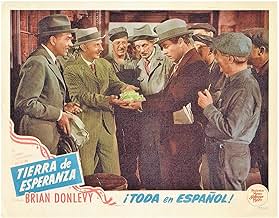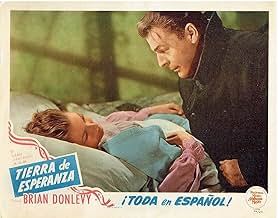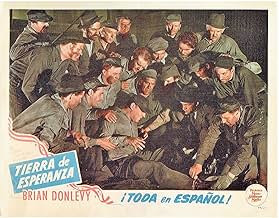IMDb RATING
6.7/10
641
YOUR RATING
Stefan Dangos, an immigrant, starts working in iron mines and steel mills. Through hard work, he rises through the ranks, eventually becoming a successful American industrialist.Stefan Dangos, an immigrant, starts working in iron mines and steel mills. Through hard work, he rises through the ranks, eventually becoming a successful American industrialist.Stefan Dangos, an immigrant, starts working in iron mines and steel mills. Through hard work, he rises through the ranks, eventually becoming a successful American industrialist.
- Awards
- 2 wins total
Stephen McNally
- Teddy Roosevelt Dangos
- (as Horace McNally)
- …
Ernie Adams
- Man and Dog Act
- (uncredited)
Fred Aldrich
- Assembly Line Worker
- (uncredited)
Axel Anderson
- Immigrant
- (uncredited)
King Baggot
- Graduation Ceremony Attendee
- (uncredited)
Charles Bates
- Teddy Roosevelt Dangos - Age 8
- (uncredited)
Barbara Bedford
- Hospitable Farm Woman
- (uncredited)
Arthur Belasco
- Drowsy Miner
- (uncredited)
Leon Belasco
- Cigar Store Proprietor
- (uncredited)
Art Berry Sr.
- Customs Man
- (uncredited)
Anna Marie Biggs
- Girl Soprano
- (uncredited)
Featured reviews
Brian Donlevy stars as an immigrant who comes to America in the late 19th century and rises through hard work to become a success.
This film was written, produced, and directed by the great King Vidor at MGM and was meant to be an American industrial epic culminating in a WW II propaganda piece with bombers flying in formation. It was also supposed to be the story of an immigrant and his family. The film was screened at 150 minutes, and Louis B. Mayer demanded the film cut down to 120 minutes. Vidor has no part in the edit, so what remains is a choppy story with lots of documentary-like scenes of industry. Most of the family story got deleted.
Initially set up at MGM to star Spencer Tracy, Ingrid Bergman, and Joseph Cotten, by the time Vidor was ready to film, Mayer balked at the cost and proceeded with a B cast of Brian Donlevy, Ann Richards, and Walter Abel. John Qualen and Stephen McNally are the only other name actors in the cast.
Saddled with a B cast, Vidor still tried to make the film he envisioned, but there are far too many cost-saving things going on, especially the cheesy sets. While there are some location shots, these are pretty much confined to industrial scenes.
The real pity is that Donlevy gives a terrific performance as does Abel in a much-reduced part. Australian-born Richards, however, is pretty bad, and her accent seems to change in every scene. With the family stuff omitted by Mayer, the narrative is choppy and the "heart" of the film is gone.
It's no surprise that after this bowdlerized version was released in 1944, it was a major flop. MGM lost a bundle and Vidor never worked for the studio again.
This film was written, produced, and directed by the great King Vidor at MGM and was meant to be an American industrial epic culminating in a WW II propaganda piece with bombers flying in formation. It was also supposed to be the story of an immigrant and his family. The film was screened at 150 minutes, and Louis B. Mayer demanded the film cut down to 120 minutes. Vidor has no part in the edit, so what remains is a choppy story with lots of documentary-like scenes of industry. Most of the family story got deleted.
Initially set up at MGM to star Spencer Tracy, Ingrid Bergman, and Joseph Cotten, by the time Vidor was ready to film, Mayer balked at the cost and proceeded with a B cast of Brian Donlevy, Ann Richards, and Walter Abel. John Qualen and Stephen McNally are the only other name actors in the cast.
Saddled with a B cast, Vidor still tried to make the film he envisioned, but there are far too many cost-saving things going on, especially the cheesy sets. While there are some location shots, these are pretty much confined to industrial scenes.
The real pity is that Donlevy gives a terrific performance as does Abel in a much-reduced part. Australian-born Richards, however, is pretty bad, and her accent seems to change in every scene. With the family stuff omitted by Mayer, the narrative is choppy and the "heart" of the film is gone.
It's no surprise that after this bowdlerized version was released in 1944, it was a major flop. MGM lost a bundle and Vidor never worked for the studio again.
I saw this movie as a nine year old child and never forgot it. Later it appeared on television and more recently on TCM. I was impressed by the hero's fortitude in walking to Minnesota to join his cousin at the Mesabe Iron Range, his hard work, and his learning to read and eventually marrying the teacher. Each of his male children was named for a president after a friend remarked their child might reach that office. The movie taught me how iron ore was shipped east and processed into steel. Dangos also moves east and becomes a foreman. He eventually becomes an automobile manufacturer and his new ideas bring him success. His children succeed by achieving through the benefits of education. The movie ends after a documentary of American industry's contribution to the war effort. The Technicolor was gorgeous and Donlevy's performance believable. I still enjoy watching this film and believe King Vidor put his heart into it.
As A career merchant seaman on the Great Lake's ore carriers, and working for a large steel maker, I found this movie most interesting and well done. This motion picture contains many historical shots of early lake vessels at the locks in Sault Ste. Marie and docking in Gary, Indiana. The story seems to be based on the life of Andrew Carnegie who was also an immigrant from Scotland. My family came from the Pittsburgh area and were employed with a large steel company, so I can relate well to the plot. Brian Donlevey visited aboard some of our vessels while making this movie in the port of Gary, Indiana. I liked this movie and watch it when I find it advertised to be shown on TV. I would own it if I could buy it because of its historical value..
Watching this film tonight and for the first time in about 40 years I also was seeing it in color for the first time and made me even more curious as to why no name stars were in the title roles with such an expensive production. From Robert Osborne I learned tonight that Spencer Tracy was originally going to be Steven Danglos instead of Brian Donlevy. Personally I would have waited for Tracy to become available and not because Donlevy gave a bad performance.
Donlevy's role is that of an Eastern European immigrant who starts work at a steel mill and by dint of his own hard work ethic rises to become a captain of industry. Along the way he woos and weds Ann Richards and they have a girl and four boys. A lot of immigrants did it that way and some are still doing it though many are illegal now. Back when we had virtually unlimited immigration because we wanted to grow the country a lot of stories like Donlevy's were possible although few rose to his heights. On both sides of my family that story could be told modified quite a bit.
In the end Donlevy is confronted with of all things labor management problems. He proves as stubborn as people like Henry Ford in that regard. If you remember in Citizen Kane a drunken Joseph Cotten tells off Orson Welles that something called organized labor is coming on the scene and what you gave your employees as largess is now thought of as their rights. Donlevy has the same paternalistic approach.
American Romance is also a tribute to the power of American industry which was growing to what we thought in 1944 as having unlimited potential. It was the backbone of our war effort and the last ten minutes without words show what Donlevy's Steven Danglos was a part of.
For reasons I think that no name star was in the lead, American Romance did not do that well. That's a pity because it's a fine film with wonderful cinematography which I finally saw on a color TV. Nice casting all around with such familiar folks as Walter Abel, John Qualen, and Stephen McNally. I hope TCM broadcasts it again soon.
Donlevy's role is that of an Eastern European immigrant who starts work at a steel mill and by dint of his own hard work ethic rises to become a captain of industry. Along the way he woos and weds Ann Richards and they have a girl and four boys. A lot of immigrants did it that way and some are still doing it though many are illegal now. Back when we had virtually unlimited immigration because we wanted to grow the country a lot of stories like Donlevy's were possible although few rose to his heights. On both sides of my family that story could be told modified quite a bit.
In the end Donlevy is confronted with of all things labor management problems. He proves as stubborn as people like Henry Ford in that regard. If you remember in Citizen Kane a drunken Joseph Cotten tells off Orson Welles that something called organized labor is coming on the scene and what you gave your employees as largess is now thought of as their rights. Donlevy has the same paternalistic approach.
American Romance is also a tribute to the power of American industry which was growing to what we thought in 1944 as having unlimited potential. It was the backbone of our war effort and the last ten minutes without words show what Donlevy's Steven Danglos was a part of.
For reasons I think that no name star was in the lead, American Romance did not do that well. That's a pity because it's a fine film with wonderful cinematography which I finally saw on a color TV. Nice casting all around with such familiar folks as Walter Abel, John Qualen, and Stephen McNally. I hope TCM broadcasts it again soon.
"An American Romance" from 1944 is partly propaganda and partly about immigrants who came to this country and went for the American dream. Originally, the stars were to be Spencer Tracy and Ingrid Bergman instead of Brian Donlevy and Ann Richards, which would have made it seem like a much bigger film. King Vidor thought he had an agreement that Tracy and Bergman would star; apparently MGM heard something else. As it is, the film is done in color and had a good budget.
The version I saw is 121 minutes; originally the film was 150 minutes and the studio ordered 30 minutes cut. There are long scenes of factory work as iron, steel, cars, and airplanes are produced, and Vidor thought the 30 minutes would come from those scenes, which are wonderful but plentiful. Instead dramatic portions were cut. The film ends abruptly.
Need I add, this was the last film King Vidor did for MGM.
The story concerns a Czech, Stefan Dangos, who emigrates to America, intending to get a job in the iron mines with his cousin. That happens, and he works his way up, along the way marrying his English tutor (Ann Richards). He graduates to steel, and finally goes into business making cars.
This is truly a story about achieving the American dream, with a lot of patriotism thrown in, as the film spans from the 1890s into World War II and America's entry into it.
The factory scenes and the scenes in the iron mines are fascinating. Of note, during World War II, there were no passenger car assembly lines in operation. As a result, Vidor had to borrow cars from Chrysler, take them apart, and reassemble them in a simulated assembly line.
Brian Donlevy, who usually plays the heavy, does a fine job here. He's no Spencer Tracy, but I liked him in the role. He's rough around the edges and very believable and likable. Ann Richards is lovely as his wife - I assume if Ingrid Bergman had done this role, it would have been built up quite a bit. Stephen McNally and Walter Abel are also featured; McNally, as one of Stefan's son, is the narrator.
Good, not great, but certainly an interesting film.
The version I saw is 121 minutes; originally the film was 150 minutes and the studio ordered 30 minutes cut. There are long scenes of factory work as iron, steel, cars, and airplanes are produced, and Vidor thought the 30 minutes would come from those scenes, which are wonderful but plentiful. Instead dramatic portions were cut. The film ends abruptly.
Need I add, this was the last film King Vidor did for MGM.
The story concerns a Czech, Stefan Dangos, who emigrates to America, intending to get a job in the iron mines with his cousin. That happens, and he works his way up, along the way marrying his English tutor (Ann Richards). He graduates to steel, and finally goes into business making cars.
This is truly a story about achieving the American dream, with a lot of patriotism thrown in, as the film spans from the 1890s into World War II and America's entry into it.
The factory scenes and the scenes in the iron mines are fascinating. Of note, during World War II, there were no passenger car assembly lines in operation. As a result, Vidor had to borrow cars from Chrysler, take them apart, and reassemble them in a simulated assembly line.
Brian Donlevy, who usually plays the heavy, does a fine job here. He's no Spencer Tracy, but I liked him in the role. He's rough around the edges and very believable and likable. Ann Richards is lovely as his wife - I assume if Ingrid Bergman had done this role, it would have been built up quite a bit. Stephen McNally and Walter Abel are also featured; McNally, as one of Stefan's son, is the narrator.
Good, not great, but certainly an interesting film.
Did you know
- TriviaDuring World War II, there were no passenger car assembly lines in operation. As a result, Vidor had to borrow cars from Chrysler, take them apart and re-assemble them in a simulated assembly line. Seen emerging from the factory are 1942 Plymouths with a Danton insignia and hubcaps. These were the last passenger cars manufactured by Chrysler before the World War II shutdown.
- GoofsAs Steve Dangos closes his front door (after arriving home from the board meeting), a hand and lower arm can also be seen closing the door from the outside.
- Alternate versionsOriginal version premiered at 151 minutes; later cut to 122 minutes.
- SoundtracksAmerica, My Country Tis of Thee
(1832) (uncredited)
Music by Lowell Mason, based on the Music by Henry Carey from "God Save the King" (1744)
Played during the opening credits
Reprised at the end
Details
Box office
- Budget
- $3,000,000 (estimated)
- Runtime
- 2h 31m(151 min)
- Aspect ratio
- 1.37 : 1
Contribute to this page
Suggest an edit or add missing content

